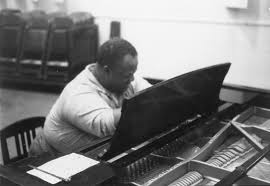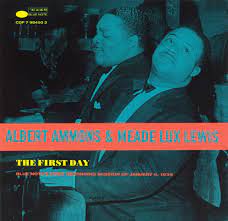Blues part 1 – Meade Lux Lewis
The first in a series of five solo explorations of the blues, recorded at the very first Blue Note Records session. Our transcription is very detailed with all important dynamic and articulation markings.
- Recording: Albert Ammons - Meade Lux Lewis - The First Day
- Recorded on: January 6, 1939
- Label: Blue Note (7-98450-2)
- Concert Key: C
- Vocal Range: , to
- Style: Swing (medium slow)
- Piano - Meade Lux Lewis
Video
- Description
- Historical Notes
- Solos
- Piano Corner
- Bass Corner
- Drum Corner
- Guitar Corner
- Inside & Beyond
- Minus You
"All of his five blues explorations in this 5-part series are in C, and all are slow blues, but at slightly different tempos. As I listened to them at first in succession, this also absolutely amazed me, because they are all different, each having their own magic. Of course, this is music from a different era; the world of 1939 is nothing like the world of today. Remember, in 1939, Meade was 31 years old, and his music was at the cutting edge at that time."
At the first ever Blue Note Records session in 1939, Meade Lux Lewis recorded five solo explorations of the blues, which between them showcase a wide variety of textures and moods in Lewis' signature boogie-woogie style. All of them are slow blues in C, and all are six choruses long except for the first which is seven choruses. These solos are generally more patterned and regimented than Melancholy and Solitude, two other slow C blues from the same session, but there's still plenty of inventiveness going on here particularly in part 1.
This first of the five blues is the fastest. It has a four-measure intro which starts with a long trill and sets up the first chorus with melodic triplet figures. In the first two choruses Lewis improvises over a wide range in the right hand, accompanied by steady, simple left-hand bass figures with a 2-feel. These bass figures continue almost throughout the solo. The third chorus introduces a rolling triplet pattern, the first example of a commonly occuring form in these five blues: a new texture is introduced at the beginning of a chorus and repeated for three or four measures, changing afterward to more freely-flowing improvisation. The fourth chorus starts with two measures of a minor 3rd tremolo, while the fifth starts with four measures of accented block chords in triplets. The sixth is the only chorus where the left hand changes to a different texture: short quarter notes voiced in open-position triads. This chorus also has tremolos in the right hand at the beginning. The seventh chorus returns to a texture similar to the first chorus, bringing back the left hand 2-feel. Chordal figures in the right hand bring the solo to a quiet close in the 12th measure of the chorus. Seven pages.
Lewis plays some interesting passing chords in the last two choruses. The left hand voicings in the sixth chorus are particularly notable; they include a 3-beat pattern repeated over the barline, with smooth voice leading using C diminished to connect C and G7 chords. A distinctive chromatic descending series of chords in the right hand appears several times in these five blues; in part 1 it's played in the ninth measure of each of the last three choruses.
Here's a link to the album page so you can see all available titles: "The First Day."
These solos are played with a rolling swing feel, and we have notated swing eighth notes in triplets in many places where the rhythmic feel is dominated by triplets.
Related Songs
Email Send Blues part 1 to a friend

Meade Lux Lewis
September 4, 1905 – June 7, 1964
Born Meade Anderson Lewis in Chicago, Meade "Lux" Lewis is one of the most important early jazz pianists. When he was a child, his father insisted that Meade learn violin. After his father died, he took up piano at the age of 16. He learned by listening to pianist Jimmy Yancey and received no training. Despite this, his considerable skill earned him the attention of the Chicago music scene, and in addition to securing local gigs, he made his recording debut in 1927 with "Honky Tonk Train Blues" for Paramount Records. Read more...

